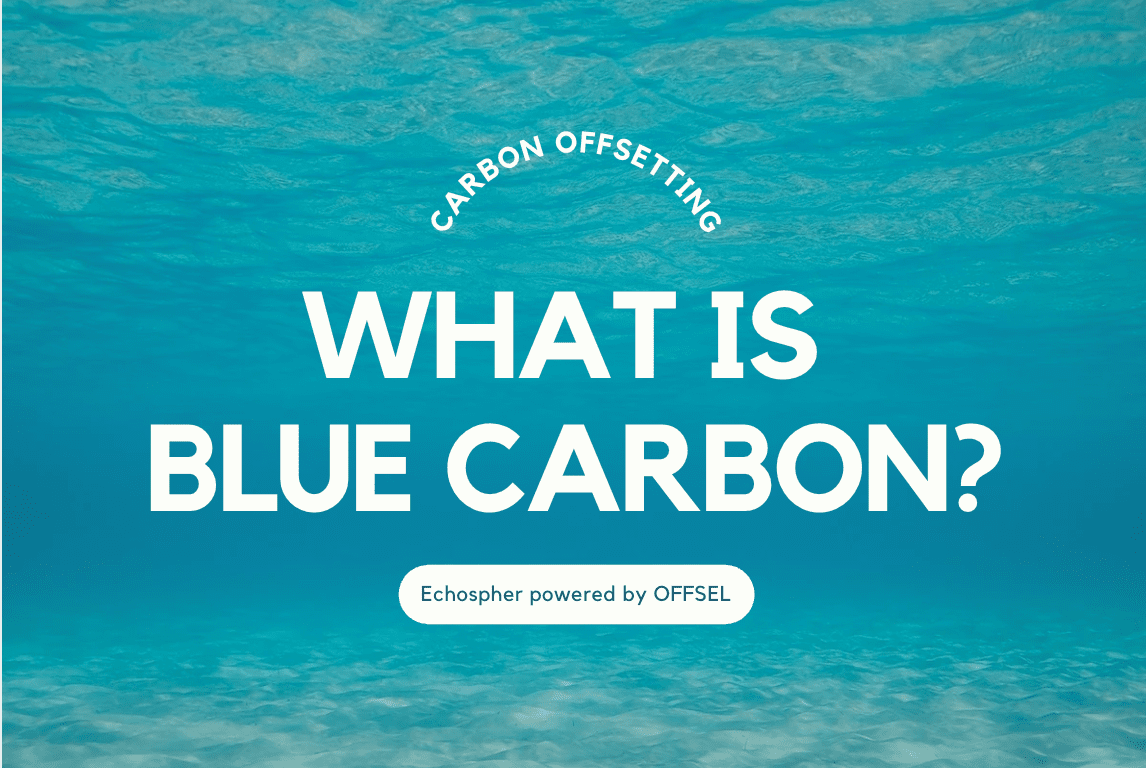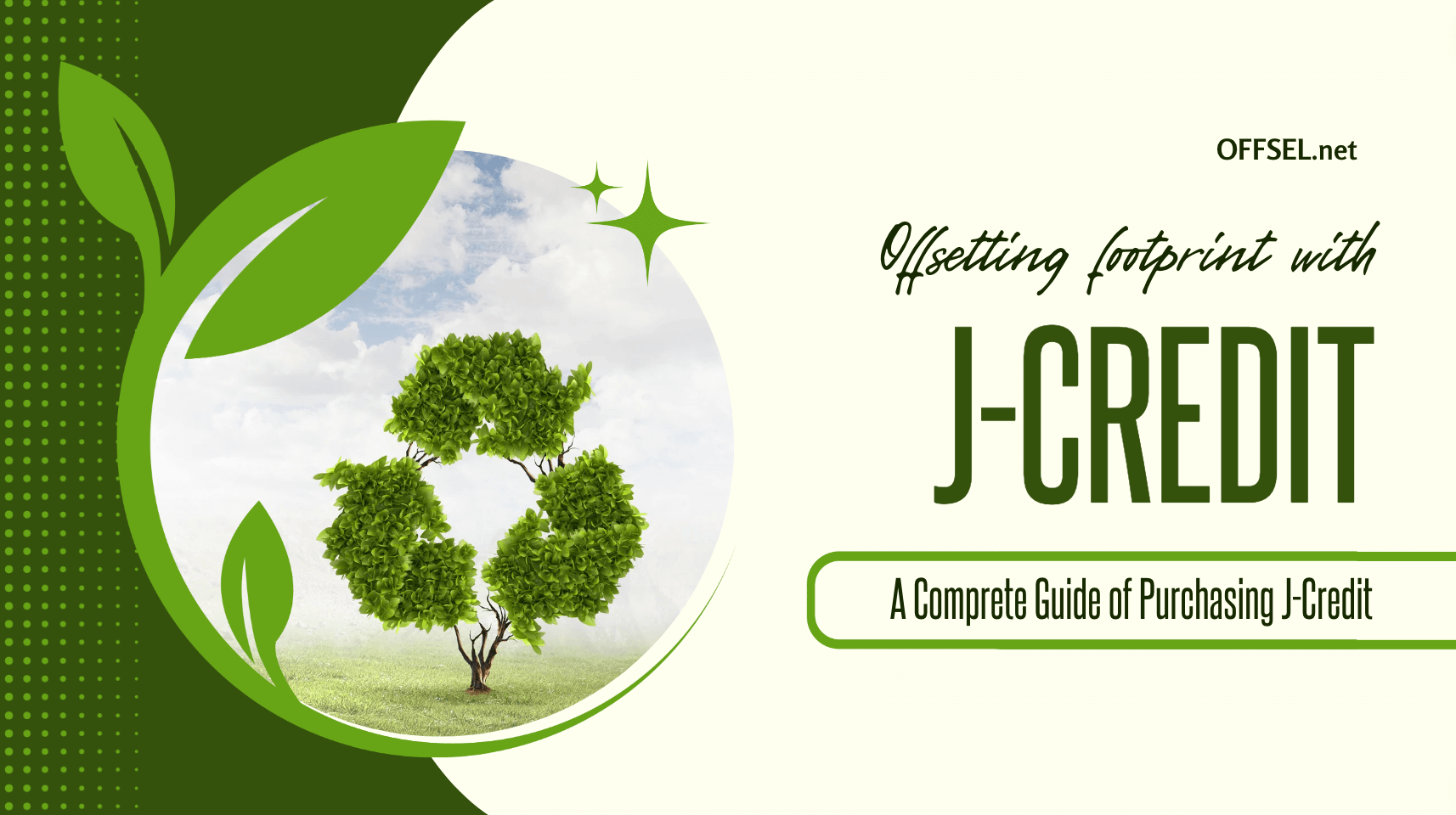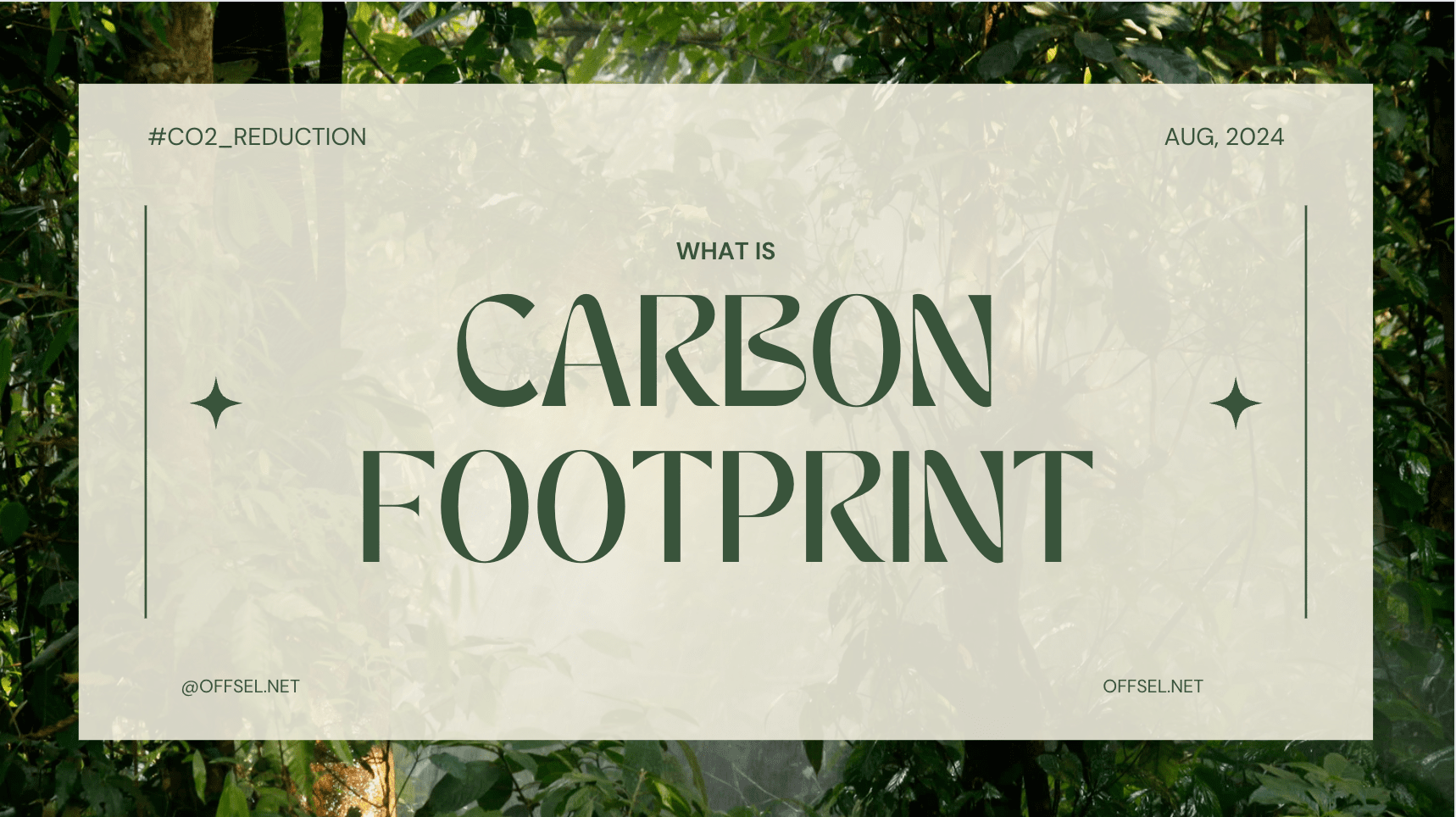Non-Fossil Certificates: Explaining Japanese Original Scheme For Offsetting
- CO2-reduction
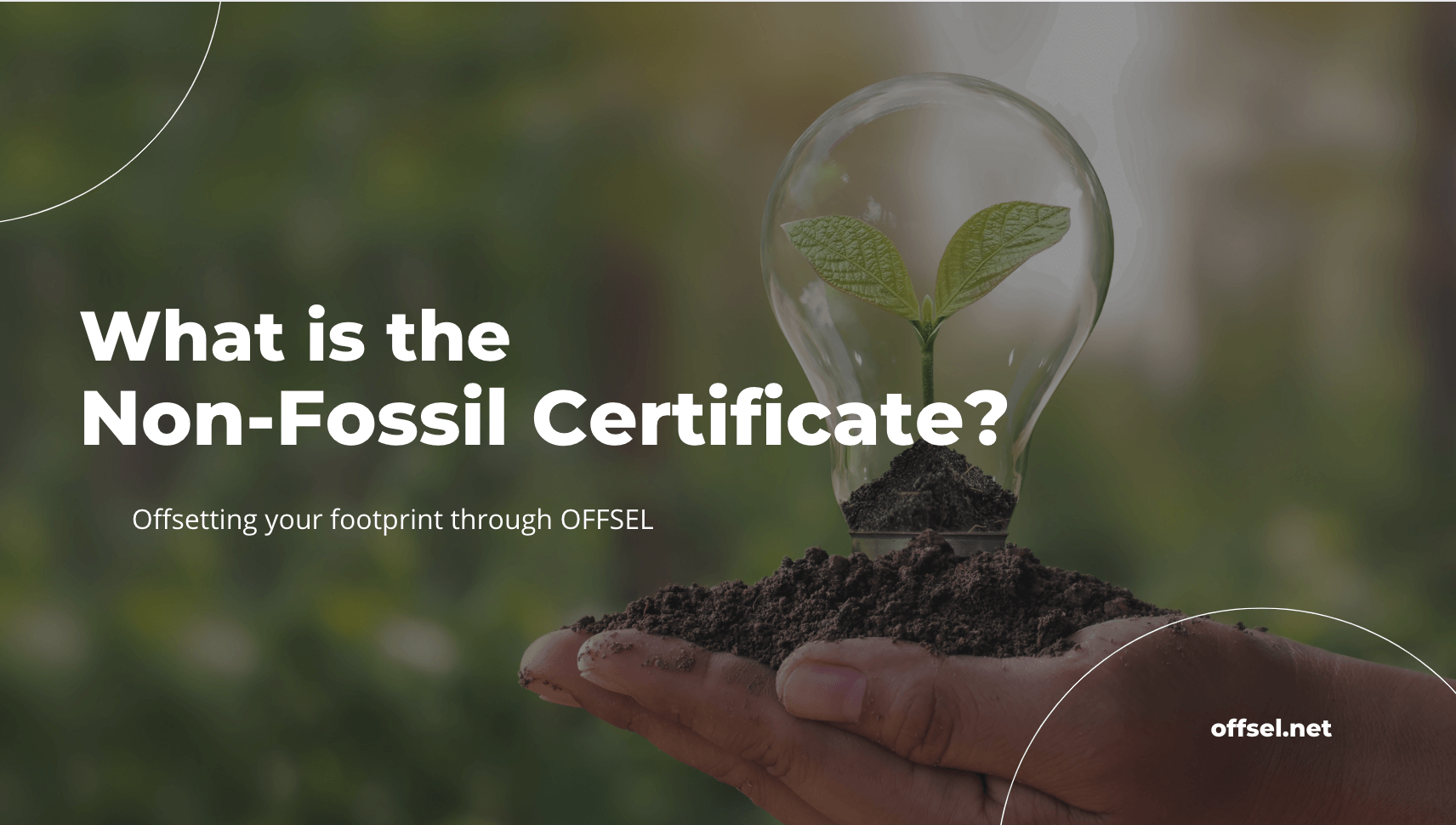
The Non-Fossil Certificate is a document that certifies the ‘environmental value’ of electricity generated from non-fossil power sources, including renewable energy, that do not emit CO2.
Key Takeaways:
- CO2 Emission Reduction: Non-Fossil Certificates help reduce CO2 emissions, beneficial for companies looking to lower their carbon footprint.
- International Standards Compliance: These certificates align with global sustainability standards like RE100, SBT and CDP, enhancing company reputations.
- Affordable Purchasing from OFFSEL: Traded at the lowest prices from OFFSEL, making them a cost-effective option for companies and local governments focused on carbon offsetting and decarbonization.
※ The next procurement of Non-Fossil Certificates is scheduled in August 2024. If you are considering, recommended to consult early.
Table of Contents
What are Non-Fossil Certificates?
Japan introduced Non-Fossil Certificates to stimulate low carbon energy sources. These certificates are part of Japanese scheme to support and validate the environmental value of electricity generated from non-fossil sources.
They are traded through the Japan Electric Power Exchange (JEPX) and used to demonstrate that the electricity purchased or consumed has a lower CO2 emission factor compared to the national average, thereby contributing to CO2-free electricity.
Non-Fossil Certificates are approved by some global initiatives like RE100, SBTi, and CDP.
How does the Non-Fossil Certificate work?
By purchasing Non-Fossil Certificates, companies can be considered to have indirectly reduced the CO2 emissions associated with the electricity it uses, thereby contributing to CO2 reduction and gaining the value of being environmentally responsible.
Previously, these environmental certificates could only be purchased by retail electricity providers, but since November 2021, power consumers and intermediaries have also been able to directly purchase Non-Fossil Certificates.
Additionally, with the increase in service providers, the volume of transactions has significantly expanded, and the minimum price has also been substantially reduced from 1.3 yen/kWh to 0.3 yen/kWh.
Types of Non-Fossil Certificates
There are three types of Non-Fossil Certificates, and we, OFFSEL, recommend you to buy FIT NFC.
| FIT NFC | Non-FIT NFC (Renewable Attributes) |
Non-FIT NFC (No Renewable Attributes) |
||
| Using methods | RE100 | ◯ | △ | × |
| RE Action | ◯ | △ | × | |
| CDP | ◯ | ◯ | ◯ | |
| SBT | ◯ | ◯ | ◯ | |
| Buying and using | Buyers | Electricity Retail Brokers Consumers |
Electricity Retail Consumers |
Electricity Retail |
| How to buy | Bid in the value trading market | Bid in the Market for Achieving Energy Supply Act Obligation | ||
| Exp. date | Year of occurrence | Year of occurrence | ||
| Price | ¥0.4~ | ¥0.6~ | ||
| Supply amount | 110 billion kWh | 140 billion kWh | ||
* NFC=Non-Fossil Certificates
- FIT NFC (Renewable):FIT Non-Fossil Certificates are issued when businesses purchase the renewable electricity through the FIT (Feed-in Tariff) system.In the FIT system, the government guarantees that they purchase the renewable electricity at a fixed. This is the most major and recommended type of NFC.
- Non-FIT NFC (Renewable):Although Non-FIT Non-Fossil Certificates are still for renewable energy, the electricity is not purchased under the FIT system. This includes electricity from large hydropower plants owned by major power companies and renewable energy electricity whose FIT purchase period has expired.
- Non-FIT NFC (No Renewable):Non-FIT Non-Fossil Certificates represent electricity that, while non-fossil in origin, is not classified as renewable energy.
Price and supply amount of FIT NFC in 2022-2023
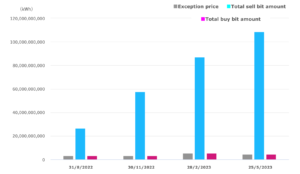 Source from JEPX
Source from JEPX
According to Japan Electric Power eXchange, supply amount of FIT Non-Fossil certificates increased from 2022 to 2023. As a result, the total contract volume in FY2023 is likely to grow to more than double that of last year, and this can be seen as a sign that the non-fossil certificate trading market is expanding.
What are the benefits of Non-Fossil Certificates?
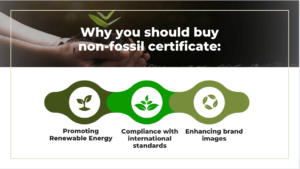
Promoting renewable energy
Non-fossil certificates are instrumental in accelerating the transition to renewable energy sources. By providing a financial incentive for renewable energy production, they encourage investment in green technologies, leading to increased development and deployment of sustainable energy solutions.
Non-fossil certificates also offer a tangible way for organizations and individuals to contribute to the reduction of global greenhouse gas emissions. By purchasing these certificates, they support renewable energy projects, which directly replace the need for fossil-fuel-based energy generation, thereby reducing carbon emissions.
Compliance with international standards and initiatives
Non-fossil certificates are recognized by RE100 that promotes the use of 100% renewable electricity worldwide. It is important to meet the standards to enhance a company’s reputation.
Non-fossil certificates can be utilized in various reports other than RE100.
◎Example:
- Global Warming Countermeasure (温対法).
- CDP (Carbon Disclosure Project)
- Science-Based Targets (SBT)
- RE100
Enhancing brand images
Companies that utilize non-fossil certificates to offset their energy consumption can leverage this in their marketing and branding strategies. This green initiative can enhance their brand image, appealing to environmentally conscious consumers and stakeholders, and can offer a competitive edge in the market.
Plus, in an era where environmental regulations are becoming more stringent, non-fossil certificate provide a straightforward means for companies to comply with renewable energy mandates and sustainability goals. This compliance is not just about meeting legal requirements but also about demonstrating a commitment to corporate social responsibility and environmental stewardship.
How to purchase Non-Fossil Certificates
Non-fossil certificates can be purchased either directly from the New “REV” (Renewable Energy Value Trading) Market or through retail electricity providers and intermediary agents.
The cheapest way to purchase Non-Fossil Certificates
The reselling service OFFSEL offers the cheapest way to purchase non-fossil certificates.
It also offers a comprehensive service for purchasing not only non-fossil certificates, but also I-RECs and J-Credits.
You can get following benefits from OFFSEL;
FAQs of buying NFC from OFFSEL
Q: Does the value of Non Fossil Certificates differ from where to purchase from?

No, the value are exactly the same.
Q: We own a FIT power plant, but is it possible to purchase the environmental value from it?

It’s possible, but it’s currently a pressing issue. In the future, it may no longer be possible. Personally, I think it should be fine for the next six months.
Q: Why can OFFSEL sell NFCs so cheaply?

Because OFFSEL is not just an agent for procurement but also one of some businesses engaged in various carbon-neutral projects, and all services are priced optimally.
※ The next procurement of Non-Fossil Certificates is scheduled in August 2024. If you are considering, recommended to consult early.
Purchasing directly from new “REV” (Renewable Energy Value Trading) Market
One option is to enter the renewable energy value trading market and purchase FIT certificates.
However, this requires meeting certain registration requirements to access the market. A more practical approach is to choose a power company that has purchased non-fossil certificates and contract an electricity plan that offers environmental value.
Non-Fossil Certificates vs RECs/J-Credit
| Attributes | Green Power Certificate | Non-Fossil Certificate | J-Credit |
| Certificate issuer organizations | Japan Quality Assurance Organization | Green Investment Promotion Organization | Government |
| Purchaser | Corporations & Local Governments | Corporations & Local Governments | Corporations & Local Governments |
| Green added value | Electricity from renewable energy generation | Electricity from renewable and nuclear power generation | Amount of greenhouse gases reduced/absorbed |
| Transaction methods | Direct purchase from the issuer | Bidding in the non-fossil value trading market | Purchase via intermediary institution or bilateral trading |
| Types of value | Environmental value | Non-fossil value | Credit |
| Resale of permitted or not | No | No | Yes |
| Reporting standard | CDP・RE100・SBT | CDP・RE100・SBT | CDP・RE100・SBT |
Difference between Renewable Energy Certificates(RECs)
RECs certify the environmental value of renewable electricity, excluding non-renewable sources such as nuclear. Unlike Non-Fossil Certificates, which have a limited trading market, RECs can be directly traded with the issuing entity, making them available for purchase by any company or organization.
Difference between J-Credit
J-Credits are not related to electricity but are a certification by the government of Japan for the amount of greenhouse gas emissions reduced or absorbed. These credits certify the introduction of renewable energy and activities such as using energy-saving devices or forest management.
Farmers, forest owners, small/medium-sized businesses, and local governments are involved with the deals and trades, and J-Credits are also notable for being resalable.
FIT Non-Fossil Certificates have been reduced from 1.3 yen/kWh to 0.4 yen/kWh from August 2023. It decreased the price of FIT Non-Fossil Certificates compared to others.
It is a challenge as it is a very expensive investment for new businesses.
The introduction of non-fossil certificates plays a crucial role in addressing these issues and promoting the widespread adoption of renewable energy. Since the system has been updated today, consumers can obtain those certificates with fewer procedures and more cost-effectiveness. It is very important to consider introducing non-fossil certificates to contribute to decarbonization.
You May Also Interested In:
A guide of Carbon Neutrality – What is the Difference between Net Zero and Decarbonization?
Everything About Carbon Credits: How They Work and their Benefits.
What is the Blue Carbon? The Importance of the System, and Pros and Cons
CONTACT US
Please feel free to contact us at anytime.
We will get back to you as soon as we
can!
Editor
OFFSEL Owned by Erevista Inc, OFFSEL is specializes in Environmental issues, especially in carbon neutrality. We primarily provide the latest information on environmental energy.


